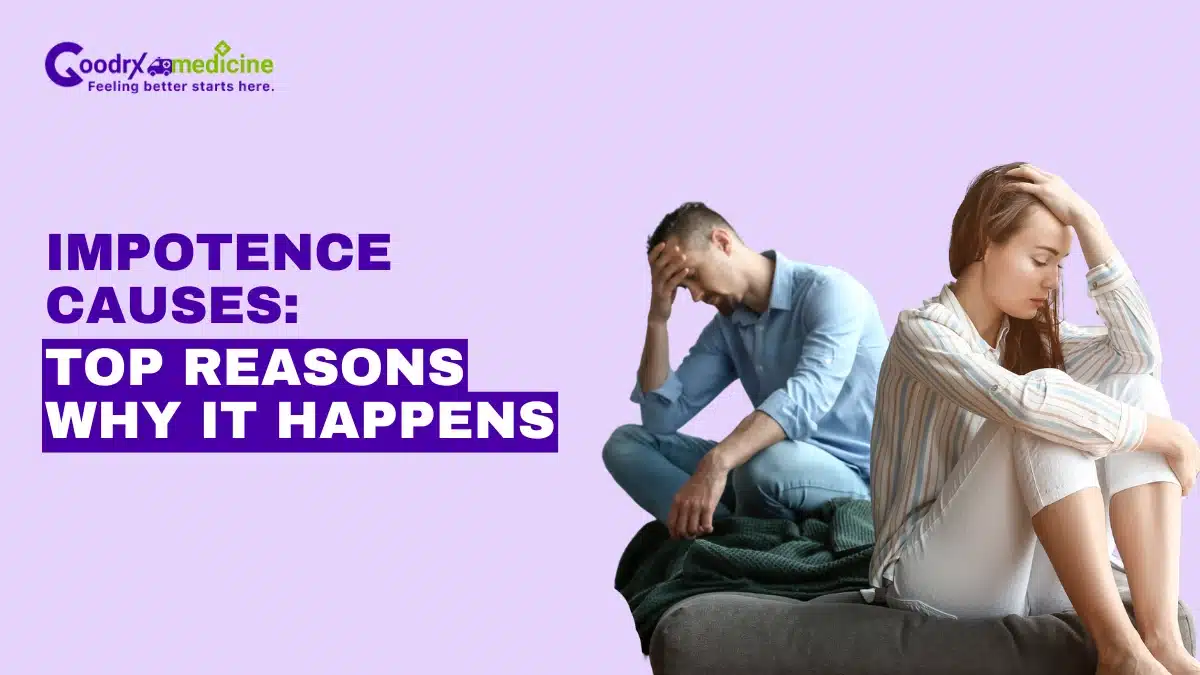Nearly half of men over 40 experience Impotence at some point, yet many feel too embarrassed to discuss it. Impotence causes range from physical conditions like heart disease or Diabetes to hormonal changes, nerve issues, or everyday factors such as stress and poor sleep.
These physical conditions can slow blood flow or nerve signals needed for an erection. The good news is that most causes can be identified and often improved with the right approach. This is not a loss of masculinity but a sign that your body needs attention.
Understanding why Impotence happens is the first step toward regaining confidence and a healthy sexual life. This article explains the most common causes so you can move from uncertainty to confidence.
Physical causes of Impotence
Physical causes of Impotence involve problems that affect blood flow, nerve function, or hormone levels essential for achieving and maintaining an erection. These causes often reflect broader underlying health issues that also impact general well-being.
These physical causes disrupt the coordination of blood flow, nerve signals, and hormones required for an erection, making management of underlying health conditions key to addressing Impotence:
- Vascular and heart-related conditions
A healthy blood supply is crucial for an erection. Conditions that reduce this flow include:
- Atherosclerosis (narrowing or blockage of arteries)
- High Blood Pressure and high cholesterol
- Obesity and metabolic syndrome
These factors stiffen or clog blood vessels, limiting blood flow to the penis and causing Impotence.
- Endocrine diseases
Hormonal imbalances play a significant and complex role in the development of impotenc, notably:
- Diabetes, which damages nerves and blood vessels controlling erections
- Low Testosterone levels reduce sexual desire and erection strength
- Thyroid disorders affecting hormonal regulation
- Neurological disorders and nerve damage
Impotence can result from damaged nerve signals from the brain to the reproductive system due to:
- Spinal cord injuries
- Nerve damage from surgeries like prostate removal
- Temporary nerve compression from activities like long-distance cycling
- Parkinson’s disease, Multiple Sclerosis (MS), or stroke
- Injuries and surgeries
Physical trauma or surgeries in the pelvic region can injure nerves or blood vessels vital for erectile function, including:
- Pelvic fractures
- Prostate and Bladder Cancer treatments
- Medications
Some prescription medications can cause or worsen Impotence, such as:
- Blood pressure medications
- Antidepressants (SSRIs)
- Chemotherapy and hormone treatments
Any medication causing side effects should be discussed with a doctor before altering the regimen.
Psychological causes
Psychological factors play a significant role in Impotence, impacting your ability to achieve or maintain an erection. Your mental and emotional state affects sexual response as much as physical health.
Key psychological causes include stress, relationship challenges, Anxiety and Depression. These factors disrupt sexual arousal and performance by affecting brain signals and hormonal balance.
Common psychological contributors to Impotence:
- Stress from work, finances, or relationships raises stress hormone levels that hinder relaxation and arousal.
- Performance Anxiety creates a fear of failure, worsening Impotence.
- Depression lowers sexual desire and can reduce responsiveness.
- Relationship issues like poor communication or emotional distance reduce intimacy and desire.
Breaking the cycle often involves counseling or therapy to address underlying mental health or emotional issues. Managing stress and having open communication with partners can significantly improve sexual function.
Psychological causes account for a sizable portion of Impotence cases, especially in younger men, and treating them improves overall well-being and satisfaction.
Lifestyle factors
Lifestyle choices significantly impact Impotence, particularly their effects on blood flow and energy levels. The good news is that many of these factors are controllable, and improving them can enhance sexual health.
Risk factors from lifestyle include:
- Smoking damages blood vessels and reduces circulation.
- Excessive alcohol use dulls nerve signals and lowers Testosterone.
- Drug misuse contributes to vascular and nerve damage.
- Lack of exercise leads to poor cardiovascular health and low stamina.
- A poor diet, exceptionally high in processed foods and unhealthy fats, promotes Obesity, Diabetes, and heart disease.
These habits contribute to vascular and hormonal changes that impair erectile function. Making steady, healthy lifestyle changes improves Impotence and boosts overall well-being. Small, consistent efforts to quit smoking, reduce alcohol, exercise, and eat well can have lasting benefits on sexual health.
Age-related factors
Impotence, or Erectile Dysfunction (ED), is not an inevitable consequence of aging, though it becomes more common as men age. Many men remain sexually active well into their 60s and beyond.
The increased prevalence of Impotence among older men is mainly because of a higher incidence of health conditions that affect erectile function. These common causes include:
- Cardiovascular Disease
- Diabetes
- Hormonal imbalances
While Impotence is more frequently seen with advancing age, it is primarily driven by these underlying health issues rather than aging. Managing these health factors can help reduce the risk of Impotence and preserve sexual function regardless of age.
Difference between Impotence and Erectile Dysfunction
Impotence is an older, broader term for sexual performance problems, while Erectile Dysfunction is the modern medical term for one specific issue. The main differences are:
- Impotence can include multiple sexual difficulties, such as trouble getting an erection, Premature Ejaculation, or low sexual desire. ED refers only to the inability to achieve or sustain an erection sufficiently firm for sexual activity.
- Impotence covers both erection problems and other aspects of sexual function. ED focuses solely on erection-related issues.
Both can share the same underlying causes, including physical factors like poor blood flow, nerve damage, and hormonal changes, as well as psychological reasons such as Anxiety and stress. Understanding the distinction helps you accurately describe your symptoms and find the right treatment.
When to see a doctor
If your erection problems happen often or are getting worse, it is essential to talk to a doctor. This is especially true if you also have issues like chest pain, shortness of breath, or sudden vision changes.
See a healthcare professional if:
- You have trouble getting or keeping an erection more than 25% of the time.
- Your erection issues cause distress or affect your relationship.
- You notice other symptoms like pain, unusual lumps, or difficulties with ejaculation.
- You have underlying health conditions, such as Diabetes or heart disease, that may require management.
Early diagnosis can help find hidden health issues and lead to effective treatment sooner. A doctor will check your medical history, perform a physical check-up, and may recommend blood tests or imaging studies to find the cause.
Conclusion
Impotence causes come from many physical and psychological factors. Physical causes include heart and blood vessel problems like Atherosclerosis, High Blood Pressure, Obesity, and Diabetes that lower blood flow. Hormonal imbalances, nerve damage from diseases or injuries, medicines, and surgeries can also stop an erection.
Psychological causes involve stress, Anxiety, Depression, and relationship troubles that affect your brain’s signals and feelings. Lifestyle choices like smoking, too much alcohol, drug use, and poor diet hurt blood flow and energy, making Impotence worse.
Age alone doesn’t cause Impotence; health conditions linked to aging do. Furthermore, Impotence and Erectile Dysfunction (ED) are different: Impotence is broader, while ED means trouble getting or keeping an erection.
If erection problems persist or worry you, see a doctor early to find the cause and get treatment to improve your health and life. Managing health, mind, and habits helps greatly.

Frequently Asked Questions
Is Impotence reversible?
Yes, Impotence can sometimes be reversed. If you find it hard to have or keep an erection, making healthy changes like exercising, eating well, and reducing stress might help. Medicines can also assist. But if there is nerve or blood vessel damage, it may be harder to reverse.
What should I expect during an ED evaluation?
During an ED evaluation, you can expect your doctor to ask about your health, lifestyle, and sexual history. You may get a physical exam and simple tests like blood work. This helps find the cause and best treatment for you.
Are there safe and effective treatments for ED?
Yes. There are safe and effective treatments for ED. You may use medicines like sildenafil or vardenafil. You can also improve your health with exercise, better sleep, and less stress. A doctor can guide you on what works best.
What is the treatment for Impotence?
The treatment for Impotence includes taking pills that help blood flow to the penis, like Viagra or Cialis 10mg. If pills don’t work, you can use injections or special medicine placed inside the penis. Also, devices like vacuum pumps or surgery can help. Counseling and healthy habits are essential, too.
How quickly do ED treatments work?
ED treatments often start working within 30 minutes to a few hours, especially medications like Sildenafil. Some treatments, like lifestyle changes or counseling, may take weeks or months to show results. Injectable medicines can work within 10 minutes. Surgery recovery might take about one month.
When referencing outside resources, GoodrxMedicine always provides full citations. To learn more about the measures we use to maintain the quality of our content, please review our Content Information Policy.










